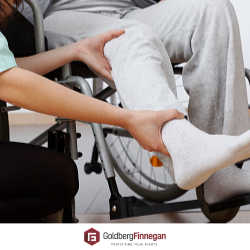Personal Injury Lawyers in Silver Spring, MD Protecting the Rights of the Injured
Our dedicated attorneys can help you build a stronger future
In our daily lives, we never want to think that we may sustain potentially catastrophic injuries due to negligence. We often take for granted personal health and safety in our daily lives. Unfortunately, you may find yourself the victim in a personal injury case. And when you are, it’s critical that you have an experienced Silver Spring personal injury attorney on your side who knows how the legal system works in Maryland.
Personal injury cases are normally serious in nature and due to another person’s negligence. If you have sustained personal injuries, this can have a devastating effect on either you or your family.
“Great experience from start to finish... Extremely skilled and knowledgeable.” – Kevin B.
 A serious injury can destroy your life in an instant. If you feel you have a personal injury claim in Silver Spring, Maryland, or surrounding areas, it’s important to understand what legal action you can pursue. Otherwise, your injury might not get the attention it deserves, and you might not get the compensation you deserve.
A serious injury can destroy your life in an instant. If you feel you have a personal injury claim in Silver Spring, Maryland, or surrounding areas, it’s important to understand what legal action you can pursue. Otherwise, your injury might not get the attention it deserves, and you might not get the compensation you deserve.
The effects of a personal injury can be life changing. You may suffer from physical pain from injuries sustained that prevent you from returning to work for a significant duration of time. You may also have to deal with emotional distress that is difficult to manage. Sadly, you may find yourself in extreme financial hardship due to your inability to work.
Get the Maryland personal injury law firm that gets results
If you have suffered injuries, it may be necessary to hire a personal injury attorney. In these cases, pursuing compensation through a personal injury claim or lawsuit is often the best way to ensure that those responsible for your pain and suffering help bear the financial responsibility for your distress. Reach out to Goldberg Finnegan as soon as possible and schedule a free consultation today.
We can answer your questions, explain your potential legal options, and get right to work gathering evidence in support of your personal injury claim or lawsuit. Remember, in most cases, most injuries are not accidents. Someone’s negligent behavior caused your injury. It’s our job to hold them accountable for their actions.
What are the most common types of personal injury cases?
The most common types of personal injury cases involve but are not limited to:
- Medical malpractice
- Premises liability
- Slip and fall accidents
- Product liability
- Boat accidents
- Train accidents
- Wrongful death
If you have suffered an injury due to negligence in Silver Spring, you should consider obtaining legal representation to get the justice you deserve. While no amount of compensation will ever be able to restore the state of physical and mental health you were in prior to the injuries you have suffered, financial compensation might help you pay for medical bills and other costs not covered by your insurance or those that may result from your injuries.
Case results matter here
- $5,175,000 Result For Brain Injury Case
- $4,500,000 Result For Surgical Error
- $4,150,000 Settlement For Birth Injury
More personal injury case results.
How do I know if I have a strong case?
 To better understand your potential personal injury claim, you would need to meet with our legal team for a free initial consultation. Our legal team can explain your legal rights as an injured party and the different options available to you, including accepting an injury claim or filing a personal injury lawsuit.
To better understand your potential personal injury claim, you would need to meet with our legal team for a free initial consultation. Our legal team can explain your legal rights as an injured party and the different options available to you, including accepting an injury claim or filing a personal injury lawsuit.
The complicated legal rules in Maryland regarding personal injury laws make it difficult to understand if you can move forward with a personal injury lawsuit. Without a skilled personal injury lawyer, the responsible party and their insurance company may offer you significantly less than your claim is worth.
How much is my personal injury case worth?
Under Maryland laws, if you have sustained a personal injury, you only have a certain amount of time to file a claim. Understanding these complex laws can be critical to potentially recovering both economic losses as well as non-economic losses in the future:
- Economic losses: Important to understand as they refer to the out-of-pocket expenses that an individual is responsible for following an injury. This includes past and future hospital bills, rehabilitation services, lost income, and lost earning capacity for future wages.
- Non-economic Losses: Non-economic losses refer to pain, suffering, mental anguish, disfigurement, and physical impairment all of which apply to past and future events involving your case.
The amount of compensation you may be able to recover will be dependent on the facts of your case and if you are able to prove the extent of your injuries. We can assist you in making the most out of your personal injury claim.
How can a personal injury lawyer help me?
Often, accident victims who have been injured do not realize their full legal rights. The fact is you could be entitled to compensation for your injuries if another party’s failure to act or negligence caused you to sustain harm or injury.
If you have been injured, the first step toward getting justice is hiring a personal injury lawyer in Silver Spring who has experience handling cases similar to yours. If you want the best chance of receiving full and fair compensation for lost wages, medical expenses, and more, contact Goldberg Finnegan immediately and let us help guide you through this complex process.
How much does a personal injury attorney cost?
If you or a loved one was injured in an accident caused by someone else, the financial impact of your injury can add up fast, especially when it comes to medical bills and lost income if you cannot work due to your injury.
The last thing you probably want is another big bill you don’t know how you can afford to pay. That’s why your Silver Spring personal injury attorneys work on what’s known as a contingency fee basis.
This payment system allows you to hire a lawyer without having to worry about how to pay for one. This is because you only have to pay us if we obtain a financial settlement or verdict for you. If we don’t win your case, you don’t have to pay us a penny. And there are no up-front costs since our legal fees come out of your settlement or verdict. It’s that simple.
Should I hire a personal injury lawyer in Silver Spring, Maryland?
At Goldberg Finnegan, our personal injury lawyers have been protecting the rights of those harmed in injury cases for years. We recognize that no amount of money will be able to restore your life and health back to the state they were in prior to your injuries.
However, we also believe that our clients deserve compensation for their injuries, medical bills, lost wages, pain and suffering, and other damages caused by someone else’s negligence. If you have sustained a personal injury, reach out to Goldberg Finnegan as soon as possible and schedule a free consultation.
Our Maryland law firm handles personal injury claims and lawsuits in Montgomery County, Prince George’s County, Howard County, Frederick County, Charles County, and other nearby communities. Contact us to learn more about how a Maryland personal injury lawyer can help you rebuild your life.
